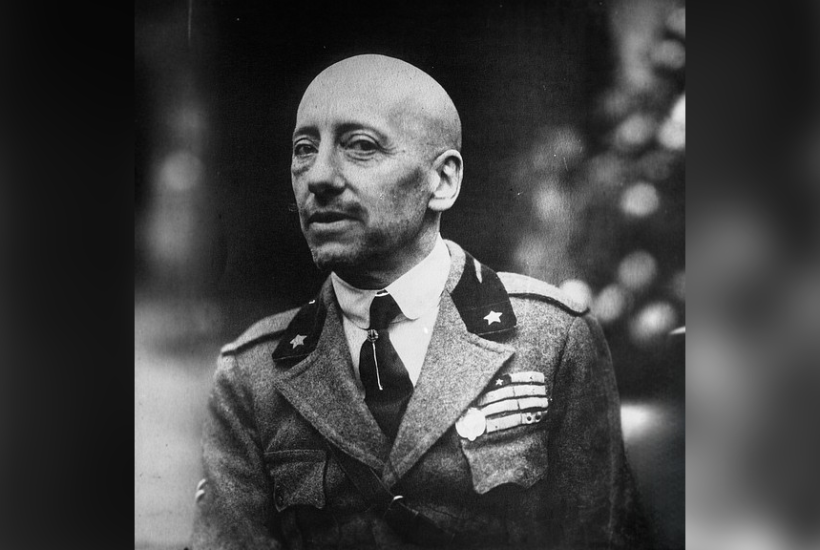We’ve all been there, haven’t we? One minute you are sitting down, with a cup of tea, ready to listen to Sir Keir Starmer’s latest conference speech, the next you wake up, 17 hours later, the tea spilled across the floor, a line of dried spittle tracked on your chin, because Keir Starmer is so intolerably boring, after a mere three seconds of his stilted and nasal delivery you lapsed into a state of unconsciousness which was sufficiently profound to register on the Glasgow Coma Scale.
This, after all, is a man whose idea of an incredible story is the time he went to a hotel and they gave him the wrong key. Starmer is the epitome of beige lifelessness. A void of charisma, he manages to make Rishi Sunak – whose latest motto is literally ‘long-term decisions for a brighter future’ – look vaguely interesting.
We think Boris Johnson is amusing mainly because of his hair, but has he ever bombed Trieste in a biplane while singing his own war cry?
All of which sounds as if Starmer is a bad choice for Prime Minister. However I am not sure he is, because I am acquainted with the life and times of Gabriele D’Annunzio, the Italian politician (and poet, rake, pilot and much else), a man so interesting he once, allegedly, had two ribs surgically removed so he could fellate himself. An allegation which has never been hurled at Sir Keir Starmer. The contrast between these politicos can teach us something about the virtues or otherwise of charisma and interestingness in certain times of public life.
If you’ve never heard of D’Annunzio, there are two ways to get to know him: you should read The Pike, by Lucy Hughes-Hallett, a brilliant biography of the man, and you should visit D’Annunzio’s final home by Lake Garda. I did both of these a few years ago, roughly at the same time.
Here are some highlights of D’Annunzio’s life. Born into minor gentry in central Italy he achieved great fame, as a poet, at an early age. And he started as he meant to go on. D’Annunzio sired many children and talked to almost none of them, he earned millions but he was often so poor he couldn’t afford postage stamps, he wore a ‘pint of Coty’s eau de cologne every day’, bought ‘prodigious amounts of cravats’, kept dozens of purebred greyhounds which he dressed in haute couture outfits made by Worth, he took his own bedsheets with him whenever he travelled, and he became so ugly he was called a ‘tragic gargoyle’ with multi-coloured teeth.
Despite this he also bedded thousands of women. He was a sadomasochist who liked his bedmates to bite him. He kept his houses stupendously warm so his lovers could lie naked on the floor. He had a famous affair with opera singer Eleonora Duse (the ‘most beautiful woman of her time’) – she admitted she was helplessly addicted to his legendary lovemaking skills.
Wherever he was, his housekeeper was expected to couple with him three times a day. He was also one of Europe’s first cocaine users. He once claimed to have eaten the flesh of babies. He nearly decapitated a dining companion. He was a ferocious warrior, and one of Italy’s greatest early pilots – he was blinded in one eye as he tried to bomb Austro-Hungary (this is in 1917). He liked to rape working class women. He probably tried incest. He loved trench warfare. And, yes, he supposedly had ribs removed so he could pleasure himself orally.
In the midst of this, he also went into parliamentary politics, styling himself the ‘MP for Beauty’; as the years passed he began to flirt with proto-fascism while Mussolini was still a socialist. In 1918 his political career peaked when he became the leader of his very own anarcho-futurist city-state, Fiume (now in Croatia). In Fiume the famous writer D’Annunzio and his thousands of loyal soldiers – the hardcore known as the Centurions of Death – ruled a world where free love reigned, where couples fornicated in cemeteries, where hard drugs were openly enjoyed, where soldiers were encouraged to have gay affairs. By the early 1920s, when the official Italian army retook Fiume, it seemed, for a moment, like D’Annunzio would become Italy’s first dictator.
However, his friend Benito Mussolini seized the opportunity, ahead of D’Annunzio – partly by copying D’Annunzio’s military style, theatre, and demagoguery – and the poet-politician instead retired to his remarkable house by Garda. Here he bedded his first outright lesbian at the age of 63 (then had her thrown out so he could breakfast on tiny marmalade cakes and champagne); he also enjoyed cocaine-fuelled orgies until his 70s; he installed half a naval battleship in the garden (it was a present from Mussolini); this is where his beloved pet turtle died of a ‘surfeitof tuberoses’. He himself died in 1938, allegedly poisoned by his Nazi girlfriend.
Today, you can still see the half-a-battleship at D’Annunzio’s house-cum-shrine: Il Vittoriale. You can also see the plane in which he flew 700 miles to leaflet the enemy capital of Vienna (composing poetry as he went). And you can view the unfortunate turtle: D’Annunzio had it cast in bronze and put in his dining room – as a warning to guests not to overeat.
And there you are. It is an entirely compelling life story. And I think it proves two things, for our purposes.
Firstly, British ‘political characters’ are, without exception, rubbish in comparison to D’Annunzio. We think Boris Johnson is amusing mainly because of his hair, but has he ever bombed Trieste in a biplane while singing his own war cry? No. And what about the vaguely interesting Rory Stewart: has he ever declared war on Britain, only surrendering after a five day bombardment by the Royal Navy? Also no.
Secondly, the life of D’Annunzio shows that, while charismatic and inspiring leaders can be good, at certain times they might be very very bad: because they can harness wild emotions and steer the ship of state into grim and unwanted places. As we have seen, Gabriele D’Annunzio certainly lived in troubled times – and he used the geopolitical chaos and his own charm as a way of mainlining something sinister into Italian politics. Fascism.
And now, here we are again, in interesting times. Far too interesting for most of us. And perhaps one way of guarding ourselves against even greater turbulence is to elect the most boring premier ever. Arise, Prime Minister Starmer; let the yawning commence.
Got something to add? Join the discussion and comment below.
Get 10 issues for just $10
Subscribe to The Spectator Australia today for the next 10 magazine issues, plus full online access, for just $10.




















Comments
Don't miss out
Join the conversation with other Spectator Australia readers. Subscribe to leave a comment.
SUBSCRIBEAlready a subscriber? Log in